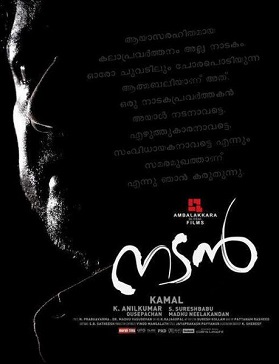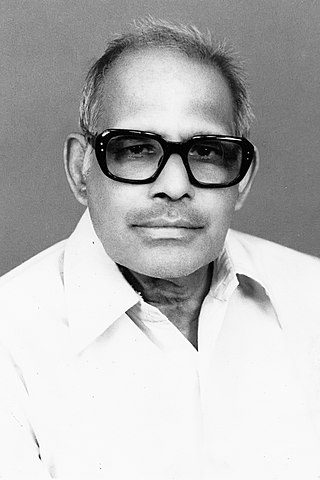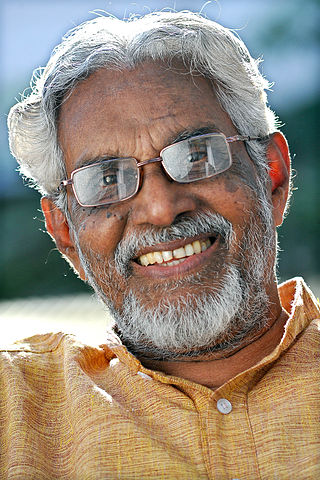
Vayalar Ramavarma, also known as Vayalar, was an Indian poet and lyricist of Malayalam language. He was known for his poems which include Sargasangeetham, Mulankaadu, Padamudrakal, Aayisha and Oru Judas janikkunnu and for around 1,300 songs he penned for 256 Malayalam films. He received the National Film Award for Best Lyrics in 1972 and was the winner of the Kerala State Film Award for Best Lyricist in its year of inception which he received three more times. He was also a recipient of the Kerala Sahitya Akademi Award for Poetry in 1962. His collaborations with G. Devarajan produced the golden era of Malayalam film music and many songs written and composed by these duo remain the ever green classics in Malayalam. Ramavarma is regarded as one of the most successful and critically acclaimed lyricist in the history of Malayalam cinema.
The Vayalar Award is given for the best literary work in Malayalam. The award was instituted in 1977 by the Vayalar Ramavarma Memorial Trust in memory of the poet and lyricist Vayalar Ramavarma (1928-1975). A sum of ₹25,000, a silver plate and certificate constituted the award originally. Now it is raised to a sum of ₹1,00,000. It is presented each year on 27 October, the death anniversary of Vayalar Ramavarma.
Yusufali Kechery was a poet, film lyricist, film producer and director from Kerala, India. He wrote during the modern era of Malayalam poetry and won the Odakkuzhal Award, the Kerala Sahitya Academy Award and the Vallathol Award.

Attoor Ravi Varma was an Indian poet and translator of Malayalam literature. One of the pioneers of modern Malayalam poetry, Ravi Varma is a recipient of Kendra Sahitya Akademi Award, Kerala Sahitya Akademi Award for Poetry and Kerala Sahitya Akademi Award for Translation, besides many other honours. The Government of Kerala honoured him with their highest literary award, the Ezhuthachan Puraskaram, in 2012 and the Kerala Sahitya Akademi inducted him as their distinguished fellow in 2017.

P. K. Gopi is an Indian poet writing in the language Malayalam and also a physiotherapist. He is a lyricist for Malayalam films and was a member of Kerala Sahitya Akademi. He was the former state president of Yuvakalasahithi.

Nadan is a 2013 Malayalam drama film directed by Kamal and written by S. Suresh Babu. Jayaram and Remya Nambeeshan play the lead roles, while the rest of the cast are former theatre artists that include K. P. A. C. Lalitha, Joy Mathew, P. Balachandran, Hareesh Peradi and Sasi Kalinga. It was produced by Anilkumar Ambalakkara under the banner of Ambalakkara Global Films. Nadan features some famous scenes from the famous Kerala People's Arts Club dramas Ningalenne Communistakki and Mudiyanaya Puthran.

Ottaplakkal Neelakandan Velu Kurup was a Malayalam poet and lyricist from Kerala, India, who won the Jnanpith Award, the highest literary award in India for the year 2007. He received the awards Padma Shri in 1998 and Padma Vibhushan in 2011, the fourth and second highest civilian honours from the Government of India. In 2007 he was awarded an Honorary Doctorate by University of Kerala, Trivandrum. O. N. V. was known for his leftist leaning. He was a leader of All India Students Federation (AISF). He died on 13 February 2016 at KIMS hospital in Thiruvananthapuram due to age-related illnesses, aged 84.
P. Kunjanandan Nair, better known by his pseudonym, Thikkodiyan, was an Indian playwright, novelist, lyricist and screenwriter of Malayalam. He was known for his contributions to the genre of radio plays and his autobiography, Arangu Kaanatha Nadan, which detailed the socio-cultural development of Malabar in the post-independent period, fetched him a number of awards including the Kendra Sahithya Academy Award, Kerala Sahitya Akademi Award for Biography and Autobiography, Vayalar Award and the Odakkuzhal Award.
Pala Narayanan Nair was an Indian poet and lyricist, best known for his work, Keralam Valarunnu, written in 1953, comprising eight volumes, which earned him the title of Mahakavi. He wrote more than 5,000 poems, which have been compiled in about 43 anthologies. Nair, who also wrote the lyrics for the 1956 Malayalam movie, Avar Unarunnu, was a recipient of the Ezhuthachan Puraskaram, the highest literary honour of the Government of Kerala as well as Vallathol Award and Kerala Sahitya Akademi Award for Poetry, besides other honours.
N. P. Mohammed, popularly known by his initials N. P., was an Indian novelist, short story writer and screenwriter of Malayalam language. Along with his contemporaries like M. T. Vasudevan Nair, O. V. Vijayan, Kakkanadan, and Madhavikutty, he was known to have been one of the pioneers of modernist movement in Malayalam fiction. He was the president of Kerala Sahitya Akademi and a recipient of several awards including Kendra Sahitya Akademi Award, Kerala Sahitya Akademi Award for Story, Kerala Sahitya Akademi Award for Novel, Lalithambika Antharjanam Award, Padmaprabha Literary Award and the Muttathu Varkey Award.

Olappamanna Mana Subramanian Namboothirippad, better identified by his family name, Olappamanna , was an Indian poet of Malayalam literature. A former chairman of Kerala Kalamandalam and an author of 20 books of poetry, his poems were noted for their explicit social expressions. He received two awards from Kerala Sahitya Academy and another from Kendra Sahitya Academy, besides honours such as Government of Madras Poetry Prize, Odakkuzhal Award, N. V. Puraskaram, Asan Smaraka Kavitha Puraskaram and Ulloor Award.

Subhash Chandran is a Malayalam novelist, short story writer and journalist from Kerala, India. His work includes the 2010 novel Manushyanu Oru Aamukham and the stories "Vadhakramam", "Sanmargam", "Parudeesa Nashtam" and "Guptham", which have been adapted into films. Chandran is the only writer to receive Kerala Sahitya Akademi Awards for both his debut story collection (2001) and debut novel (2011).

Parakkulathil Vatsala was an Indian Malayalam novelist, short story writer, and social activist from Kerala. She is a recipient of Ezhuthachan Puraskaram 2021, the highest literary honour by the government of Kerala. She is only the fifth woman to receive the award since its institution in 1993.

Mundanat Leelavathy is a Malayalam writer, literary critic and educationist. She taught at various colleges in Kerala before retiring as Principal from Government Brennen College, Thalassery. During her long literary career, she won several awards including Sahitya Akademi Award and Kerala Sahitya Akademi Award. She is a contemporary of such noted critics in Malayalam including K. M. George, S. Guptan Nair, N. Krishna Pillai, P. K. Balakrishnan, M. K. Sanu and Sukumar Azhikode. Leelavathy is a recipient of the Padma Shri Award.

A. Sethumadhavan, popularly known as Sethu, is a Malayalam fiction writer. He has published more than 35 books. He won the Kendra Sahitya Akademi Award in 2007 for the work Adayalangal. He received the Kerala Sahitya Akademi Awards in 1982 and 1978 for his works Pandavapuram and Pediswapnangal; and Vayalar Award for Adyalangal in 2006. He also won Odakkuzhal award for his novel Marupiravi. Sethu's other literary works include Velutha Koodarangal, Thaliyola, Kiratham, Niyogam, Sethuvinte Kathakal and Kaimudrakal. He also served as the chairman and CEO of the South Indian Bank. In 2022, he won the Ezhuthachan Puraskaram, highest literary honour of the Kerala Sahitya Akademi.

Puthussery Ramachandran Pillai was an Indian poet of the Malayalam language. He was a scholar of Dravidian linguistics and a professor of Malayalam for more than three decades. On 14 March 2020, he died of age-related illnesses.

Narayanan Nambuthiri Kakkad, commonly known as N. N. Kakkad, was an Indian poet of the Malayalam language. Known for works such as Saphalmee Yathra, Pathalathinde Muzhakkam and Changatham, he was a Sanskrit scholar and was known to have been proficient in painting and music. He was a recipient of several awards including Odakkuzhal Award, Asan Smaraka Kavitha Puraskaram, Kerala Sahitya Akademi Award for Poetry and Vayalar Award.

Ezhacherry Ramachandran is a Malayalam poet, lyricist and journalist. He has penned lyrics for several Malayalam movies and albums. In 2020, he won the Vayalar Award.
Chowallur Krishnankutty was an Indian lyricist, journalist, screenwriter and actor. He has penned hundreds of Malayalam devotional songs. The song Oru neramenkilum, from the Tharangini album Thulasi Theertham is the most popular of his lyrics. Krishnankutty had written screenplays and acted in several Malayalam films and also wrote the dialogues for the film Sargam. A recipient of the Kerala Sahitya Akademi Award, Krishnankutty also served as the vice-chairman of the Kerala Kalamandalam.














